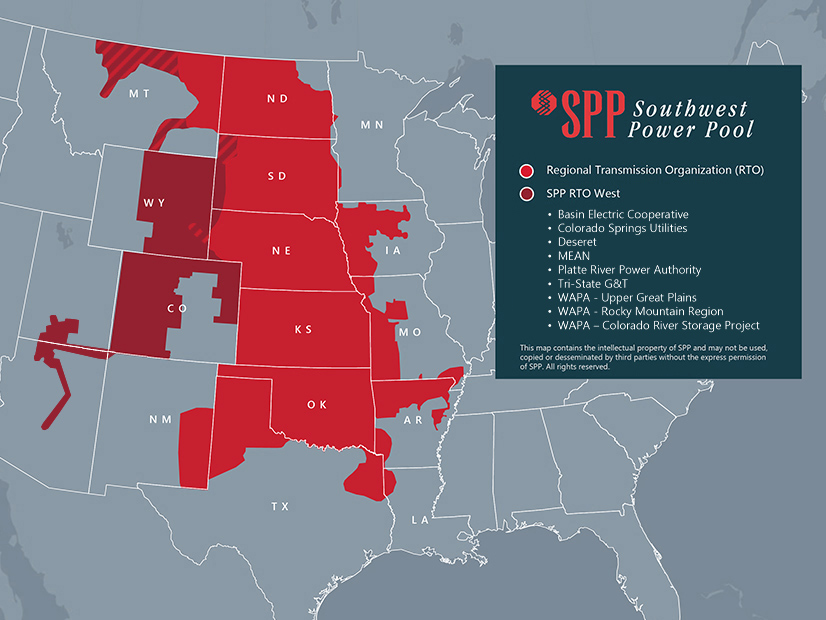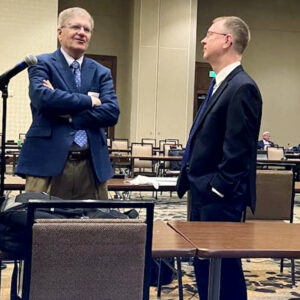Stakeholders Re-elect 3 PJM Board Members Over Consumer Dissent
BALTIMORE — The Members Committee voted to re-elect three members of the PJM Board of Managers, placing Paula Conboy, David Mills and Vickie VanZandt on the board for additional three-year terms.
Board member and Nominating Committee Chair Dean Oskvig said all three candidates are completing their first term on the board and “hit the ground running” in his experience working with them. Conboy and Mills were first elected to the board in 2021, while VanZandt was appointed to the board in September 2022, following the resignation of board member Sarah Rogers.
Greg Poulos, executive director of the Consumer Advocates of the PJM States (CAPS), told the MC that several advocates were voting against their re-elections to express frustration and waning confidence with the board’s handling of the clean energy transition, market power concerns and the lack of analysis on the cost impacts of transmission.
Poulos also stated there’s uncertainty around the functioning of the capacity market and a feeling that the board rushed stakeholders to a vote on proposed revisions to the Operating Agreement and tariff to transfer filing rights over regional planning from PJM’s membership to the board.
The MC voted against that proposal May 6 and on May 13 the board issued a notification that it’s deferring action until after the May 13 FERC order on regional planning. (See Members Vote Against Granting PJM Filing Rights over Planning.)
Because the board tends to speak as a single body, Poulos said it’s difficult to discern where individual board members stand on issues and the advocates’ “no” votes were not against any of the candidates as individuals, but rather to signify dissatisfaction with the direction the board has taken.
Productive Year of Changes in 2023, Say Asthana and Midgley, Challenges Ahead
PJM CEO Manu Asthana opened the RTO’s 2024 Annual Meeting stating the organization has had an exceptionally strong year of reliability and is in the process of implementing market redesigns drafted throughout 2023 to poise PJM to continue performing well.
Changes to the Reliability Pricing Model (RPM) created through last year’s Critical Issue Fast Path (CIFP) process calibrate market signals to the energy transition’s new realities, he said. The changes also move ahead on improving generation accreditation, adding sophistication to risk modeling and enhancing testing of generator’s capabilities, he added. (See FERC Approves 1st PJM Proposal out of CIFP.)
Asthana said the January 2024 Winter Storm Gerri presented many of the same challenging conditions as the December 2022 Winter Storm Elliott, which pushed PJM into some of its most severe emergency procedures and was one of the contributing factors to launching the CIFP process. This time around, however, transmission and generation performance improved, and PJM’s load forecasting was accurate in the days ahead of the storm. (See PJM: ‘Conservative Operations’ Maintained Reliability During Jan. 2024 Storm.)
“We learned from the experiences of Elliott, and we saw it come to fruition in Gerri,” he said.
PJM also initiated the transition to a cluster-based approach to studying new generation interconnection requests in 2023, Asthana said, setting a goal of completing the fast-track queue this year.
“We’re making a lot of process on generation interconnection, which I feel good about,” he said.
The acceleration of the clean energy transition is catching the world flat-footed, and more work is needed at PJM, he said. Generation deactivations, new entries and the pace of load growth are surprising, particularly with the introduction of data centers, electric vehicle charging and hydrogen production load, Asthana said. The timing of the transition largely is out of PJM’s control and policy tradeoffs likely will be needed but he said discipline and effort in the stakeholder process can reveal solutions.
“There is a lot of work that we still have to get right working together and time is not our friend,” he said.
MC Chair Sharon Midgley, Exelon vice president of federal regulatory affairs, said the CIFP changes and a proposed regional planning paradigm will improve PJM’s ability to meet rapid load growth and changes in the generation mix. PJM’s proposed long-term regional transmission planning (LTRTP) process is being considered by the Markets and Reliability Committee, which deferred a vote April 25 to await the FERC regional planning order. (See “Stakeholders Defer Vote on Long-term Planning Proposal,” PJM MRC Briefs: April 25, 2024.)
“I am cautiously optimistic that we will see some order of LTRTP implemented at PJM in the short term,” Midgley said.
She also highlighted the proposal to transfer Federal Power Act Section 205 filing rights over the transmission planning protocol to PJM, stating PJM will need every tool at its disposal during the clean energy transition. PJM currently is the only RTO that does not have these rights over its planning rules.
Stakeholder collaboration also will need to be centered in PJM’s efforts to navigate the transition, she said. “It is incumbent on everyone in the room to work together to ensure reliability through the energy transition.”
PJM Panel Discusses Innovation and Technology
PJM held a panel on its efforts to use innovation to find solutions to the challenges posed by climate change, generation interconnection and control-room operations. The panel was moderated by Chief Communications Officer Susan Buehler and featured Chantal Hendrzak, executive director of IT operations and architecture; Dave Souder, executive director of system operations; and Emanuel Bernabeu, senior director of applied innovation and analytics.
As more intermittent resources come onto the grid and weather becomes less predictable, Souder said forecasting needs to look not only at the storms’ magnitudes but also their precise timing to understand how weather may impact available generation, adding that even thermal resources can be affected by higher water and ambient air temperatures. He said PJM is looking at expanding its data science team to investigate factors such as the impact ice can have on wind turbines, wildfires interrupting solar output and high winds disrupting thermal generators.
Machine learning can be employed in the control room to analyze past outages and the responses taken to determine which solutions may be best employed in real-time operations. During the June 2022 derecho that caused outages in Ohio, Bernabeu said technology could have reduced load shedding by about 20% and allowed grid operators to make critical decisions more quickly.
Hendrzak said AI tends to be limited by its focus on learning from past experiences, but in the context of cybersecurity it can be used to develop a baseline pattern of normal user behavior to detect anomalous activity that could signify an intrusion.
Bernabeu said one of the challenges in using machine learning to improve operations is the infrequency of major events on the grid, increasing the importance of interregional information sharing about outages.
“It’s a terrible thing to waste a blackout so I always go and inspect everything about them,” he said.
Hendrzak said she foresees a role for AI in the generation interconnection process to aid developers in identifying the best locations to site resources with minimal grid impacts, as well as for PJM to run network upgrade studies in parallel and to identify which projects are the most likely to succeed in reaching commercial operation. Souder said this will become increasingly important as the resource mix changes and it becomes more difficult for transmission owners to take lines down for outages.
One of the challenges PJM and the electric industry face when integrating new technologies is the availability of data scientists. Out of the hundreds of programs PJM has designed in-house or through contractors, Hendrzak said they tend to be written by the same groups of industry-specialized engineers.
Stakeholders Endorse GDECS Revisions
The committee endorsed a slate of revisions to PJM’s governing documents recommended by the Governing Document Enhancement and Clarification Subcommittee (GDECS), the most notable of which was changing several references to “end-use customers” to be lowercased. Changes also included removing outdated terminology, grammatical corrections and updating cross references.
PJM Counsel Daniel Vinnik argued the uppercasing of end-use customer in multiple sections related to energy efficiency and demand response was an error and was not meant to limit participation in those programs to PJM members in the End-use Customer sector. He said PJM’s implementation of the language has remained the same before and after the uppercasing and noted the formatting was inconsistent throughout the sections.
Paul Sotkiewicz, of E-cubed Policy Associates, said he’s concerned about making substantive changes through the GDECS process rather than bringing the revisions through the stakeholder process with an issue charge. He argued that some of the uppercasing may not have been an error, particularly in Schedule 6 language around energy efficiency.



